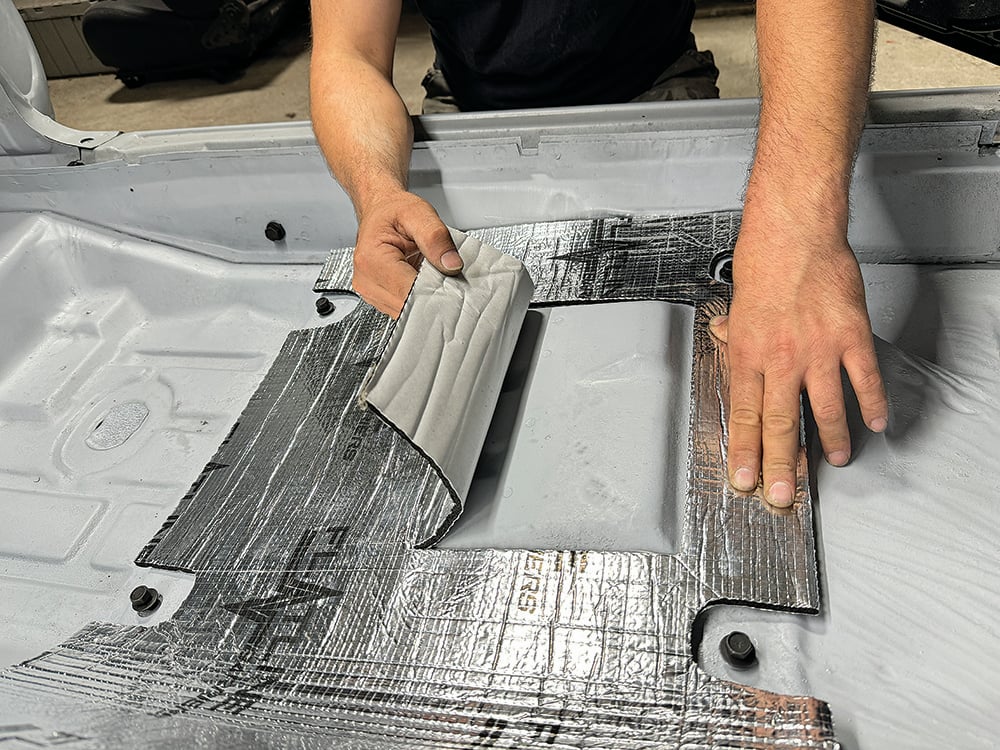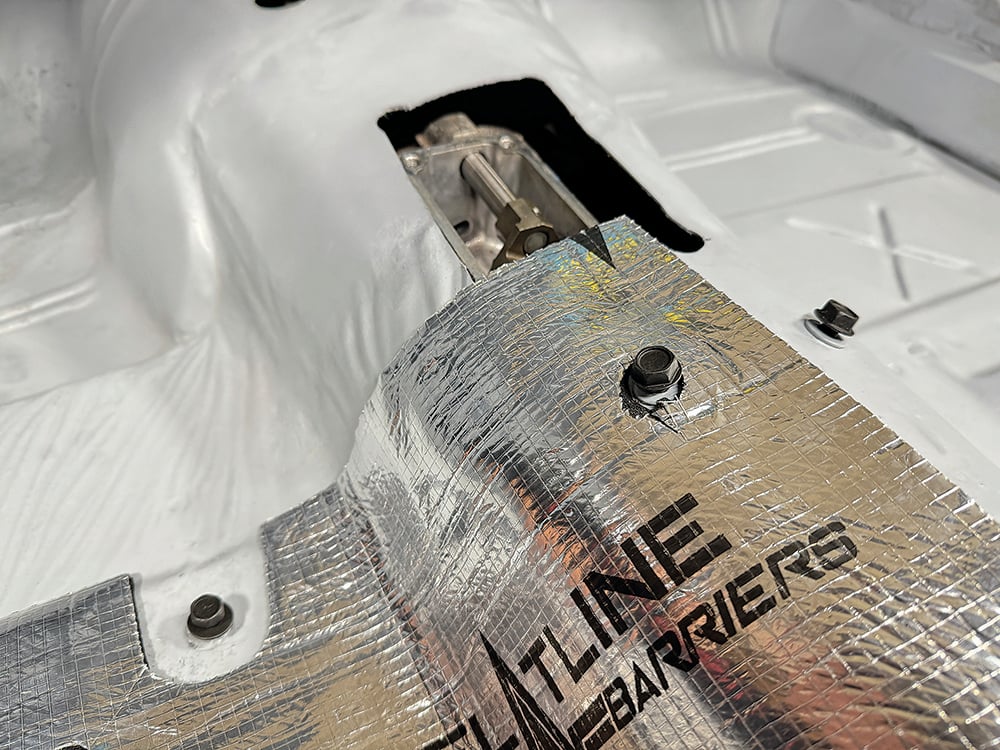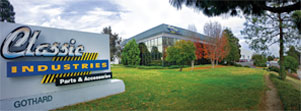
There’s nothing worse than hitting the road in your high-performance Chevy and being assaulted by excess heat and vibration as you lay down the miles. Between adding an upgraded driveline and high-flow exhaust, the amount of heat generated has a direct connection through the floorpan.
The heat rises directly into your interior, and there’s no way the factory jute-style padding will suffice to handle the job. Regardless of whether you’re taking on a full build or simply making updates, it’s a solid idea to think about upgrading your insulation complemented by sound deadening to help tame all that rattle ’n’ roll generated by the road. We’re here to tell you that there’s a simple solution to the problem, one that you won’t even break a sweat over, when installing products direct from the makers of Flatline Barriers.
Regular readers of 'All Chevy Performance' will recognize the 1971 Camaro showcased across our pages, having followed its transformation from that of a bare shell. Over time, we focused on its suspension, brakes, LS driveline, cooling, exhaust, sheetmetal, and wiring. As we head deep into the interior, our initial thought was to give it a more civilized experience by trying to eliminate excess heat and road noise, especially with it packing an aggressive LS under hood. Recently, we followed up at Procision Industries in Taunton, Massachusetts, where shop owner Pat O’Brien was preparing to move forward by taking on this very subject. After reviewing various offerings on the market, he made a decision to contact Classic Industries, one of the distributors for Flatline Barriers.
"Where Heat and Sound Meet Their Maker"
If your company slogan is “Where heat and sound meet their maker,” you’d better be able to live up to it. We’re here to tell you that the product, comprised of an external aluminum thermal barrier, eliminates radiant heat while its second layer of ultra-lightweight foam silences unwanted noise, vibration, and resonance with a totally light-as-a-feather formula. With its simple peel ’n’ stick application requiring no special tools except for hand pressure and a razor (or scissors) to occasionally trim, it’s a snap to install, especially for a DIY afternoon project once the area is prepped. It’s also important to note that the product is extremely flexible and able to be installed in any ambient temperature.
Flatline Barriers has engineered complete precut kits for an exact fit in an endless array of muscle cars and trucks while also offering universal kits for custom applications. For our installation, we selected three individual precut kits to cover the floor, roof, and door areas with part numbers TABF2012, TABF2031, and TABF2004, respectively. By raising the bar, they have incorporated cutting-edge technology and materials to create a true lightweight solution in significantly reducing unwanted heat and sound from your interior. Follow along as we show just how simple and effective an afternoon install can be.
The Installation Begins...

1. To add the perfect combination of insulation and sound deadening to the second-gen Camaro, we contacted Classic Industries for three Flatline Barriers Direct-Fit kits to work with our application, including ones for the entire floor, roof, and doors.

2. Here, you can see the complete empty interior as this is an ongoing full build, which has been stripped to bare metal and sealed with epoxy primer.

3. To begin, Pat O’Brien of Procision Industries prepares to clean the area, starting with completely vacuuming it of any visible debris.

4. Next, the manufacturer recommends cleaning the application surface with a degreasing agent. For this job, O’Brien used UPOL System 20 Fast Drying Degreaser (PNUP2012). Making sure to cover the entire application surface, spray one section at a time and wipe down with clean microfiber-style cloths. Then allow ample time to completely dry before proceeding to the next step.

5. The direct-fit floor kit (PN TABF2012) comes complete with nine precut sections, as shown, ready for installation with the only tool needed being a razor blade and/or scissors for minor trimming, if needed.

6. Be sure to have all bolts in place for fitment in cutting access areas prior to installing the insulation sections. Here you can see the mounting bolts for the center console installed as a guide. Remember, any wiring you wish to have access to after the installation will need to remain above the insulation.

7. Test-fit every section prior to the installation. Here, the driver side floor seat section is precut to allow for the seat mounting bolts as well as the raised area of the floorpan.

8. O’Brien then peeled back half of the adhesive barrier backing to begin the installation, Note, you should be sure of perfect alignment prior to placement as the self-adhesive barrier is extremely sticky and unforgiving to movement once set in place.

9. With half of the section set in place, it’s as simple as applying hand pressure to the outer surface to secure it to the surface of the floor while following all the curves in the area.

10. Follow by removing the balance of the adhesive barrier backing to prepare it for installation.

11. Press into place and move across the section, moving toward the center of the floorpan.
%20copy.jpg?width=1000&height=750&name=012%20Cutting%20insulation%20to%20fit%20around%20components%20inside%20the%20Camaros%20floorpan%20(1)%20copy.jpg)
12. As the section was approaching the transmission tunnel, a simple cut was made to accommodate the bolt for the center console using a razor blade.

13. One simple cut made for a perfect fit.

14. The completed section was a snap to install; note how perfectly it conforms to the floorpan.

15. The front driver and passenger floor seat sections are now set in place.

16. The driver side footwell section was then test-fitted as the next step of the installation.

17. Once fitment was confirmed, half of the adhesive barrier backing was removed to get started. Continue to complete while pressing the panel into place.

18. Here you can see the completed installation to the front half of the interior floorpan.

19. The transmission section was then test-fitted into place.

20. Since there are many variations for transmissions, depending on whether your car is stock or modified, the section is left blank, allowing the user to customize it to fit their needs. This area was completed with a razor blade once confirmed.

21. Nice, clean fitment to the tunnel is complete.

22. The rear passenger footwell area comes in one large section. Be sure to test fitment before getting started.

23. For ease of installation, O’Brien chose to remove small sections of the adhesive barrier backing and start the placement from the transmission tunnel, working his way outward on each side into the footwells.

24. The largest single section for installation was for the rear seat area of the floorpan. Once again, test-fit to ensure fitment and gradually remove adhesive barrier backing and press into place, conforming to all areas.

25. Next, the smallest filler panel sections were set into place.

26. Here, you can see the incredible amount of coverage provided by the kit, covering every area of the floorpan with Flatline Barriers insulation and sound-deadening material.

27. Placement of the roof insulation and sound-deadening kit (PN TABF2031), once the surface area was prepped, was simple, taking only a few minutes to install.

28. Our final step was prepping the doors for the sound deadening and insulation kit (PN TABF2004). Here you can see the inner sections once they were set in place.

29. Finally, a test-fit was done on the inner door section; once confirmed, the adhesive barrier backing was peeled, and they were set in place. Note there are several pre-punched areas that can be opened up for inner door access, if needed.

30. The finished installation is simply amazing with not only its complete interior coverage but also the time saved during the installation process. The second-gen will now benefit from excellent sound deadening once it hits the road, and to us that’s well worth the investment.
Editor's Note: This article was written and photographed by Chuck Vranas for 'All Chevy Performance' magazine, where it originally appeared. Thanks, Chuck!
Classic Industries and Flatline Barriers - Say Goodbye to Heat and Noise in Your American Muscle Machine

Whether you have a Chevy Camaro, a Dodge Challenger, a Ford F100, a Dodge truck, a GMC pickup, or pretty much any American muscle car or truck that you may have, there's a great chance there's a Flatline Barriers kit for your vehicle at Classic Industries. You can also initiate your search here: Flatline Barriers.
For all of those must have restoration parts, performance parts, and accessories for your muscle machines, you can shop online at Classic Industries. To enhance your parts search, you can shop from one of the many enormous vehicle catalogs that are available both in print and in pdf format. Simply click the button below to find the catalog(s) that you need.




